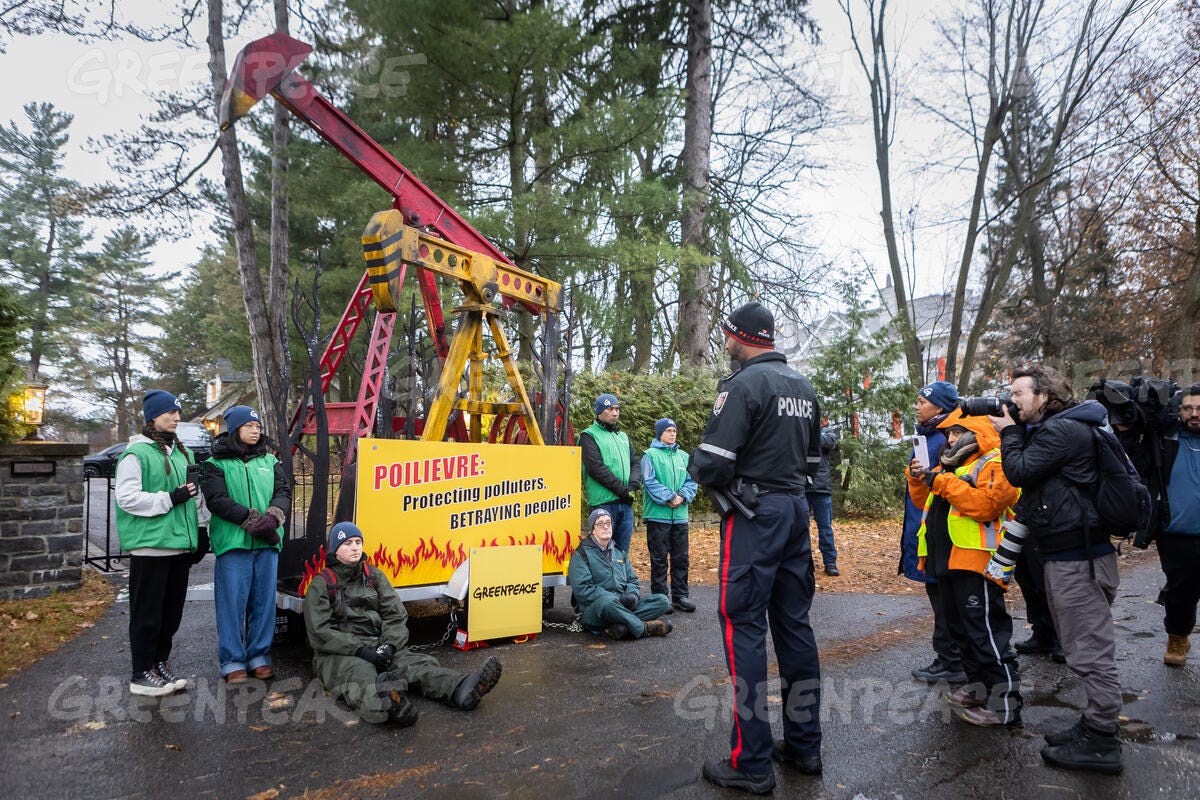Greenpeace protestors during sit-in at the official residence of Pierre Poilievre Credit: Greenpeace
Early morning November 21, 2024, twelve Greenpeace activists set up a replica oil jack on the driveway leading to Stornoway, the official residence of the Leader of the Opposition, Pierre Poilievre. The oil jack was surrounded by a symbolic burned forest made with charcoal from the 2021 wildfire that destroyed the town of Lytton, British Columbia.
That art installation symbolised the costs of climate inaction that will only intensify under Poilievre’s anti-climate agenda. Find more about artist, Jonah Kamphorst, and his multi-disiplinary work here.
Keith Stewart, Senior Energy Strategist at Greenpeace Canada, and the Greenpeace activists unveiled a strong message that stated, “Poilievre: Protecting polluters, betraying people.”
Keith Stewart chained to oil jack pump Credit: Greenpeace
Today, I’m in conversation with Keith Stewart discussing why it’s so difficult for some Canadians to realize that Poilievre and the Conservative Party of Canada are promoting an anti-climate agenda that would fuel the climate crises while protecting polluters over people.
In fact, Keith predicts, that if elected, Pierre Poilievre will be Steven Harper on steroids when it comes to protecting the oil and gas industry.
We take a closer look at Poilievre’s climate plan, which is mostly sound bites without substance. So far, Poilievre claims that he will focus on technology rather than taxes — without explaining how that would be executed.
Poilievre plans on cancelling the consumer carbon tax and associated rebates as well as new clean fuel regulations.
He has said that he would not implement the proposed oil and gas pollution cap, but would approve new nuclear projects.
Perhaps most egregiously, Poilievre would approve liquified natural gas (LNG) exports to Asian countries despite evidence that methane is 80 times more potent than carbon dioxide (CO2) at warming the climate over a 20-year period. And, despite research proving shipping LNG would put at risk the humpback whales, pods of orca, fin whales and porpoises that eat, play and raise their young in the Kitimat fjord system.
Not to mention the fact that, had the $20 billion that was invested in the LNG Canada project been used to fund investments in wind, solar or free heat pumps for all Canadians, then consumers would be benefiting from more affordable energy bills while helping to fight climate change.
While Poilievre claims he won’t pull out of the Paris Climate Accord, it seems pretty clear his climate plans will miss Canada’s current 2030 climate target.
The truth is, Poilievre doesn’t want to talk about investing in renewables because he supports big oil. In fact, in October 2024, Greenpeace revealed that Poilievre organized a fundraiser where Big Oil’s top lobbyists paid $1,650-a-plate for a private meeting with him. That was after Poilievre declared in a National Post op-ed (May 2024) that corporate Canada should fire their lobbyists because he will only listen to the people. Sounds like a good old Conservative party bate and switch.
Increasingly, oil and gas companies are turning to Conservative governments to protect their market share from renewables and to defend the industry from its critics, in this case, Greenpeace.
That’s why Alberta’s United Conservative government placed a seven-month moratorium (2023) on all renewable development that will have lasting impacts. Alberta’s United Conservative Party has also been actively blocking federal funds meant to help oil and gas workers transition into green energy careers.
Meanwhile, Ontario’s Conservative government passed Bill 165: Keeping Energy Costs Down Act (2024), despite the fact that the Ontario Energy Board (OEB) said no to Enbridge’s plan to burden existing customers with an annual cost of $250 million for installing gas piping to new homes and businesses.
While the OEB cited more homes being fitted and retrofitted with less expensive, cleaner heat pumps and induction stoves, the Ford government increased natural gas costs for consumers while accelerating the climate crisis and impeding Ontario’s transition to a green economy.
Keith wants folks to remember that the oil under the ground belongs to all Canadians – not just the oil companies. So, why is it that oil and natural gas are still not treated as part of the public commons and their sale used to benefit all Canadians?
Depending on the size of their taxable capital, Canadian oil companies pay between nine and 15 per cent in corporate taxes. That’s extremely low when compared with the United States, 25 per cent, and Norway, 78 per cent.
At the same time, federal and provincial governments use taxpayer dollars to provide financial supports, or tax breaks, to fossil fuel companies. These subsidies cost Canadian taxpayers at least $6.03 billion every year. That’s roughly $214 per taxpayer annually.
And, we haven’t even begun to discuss the costs to the public to clean up approximately 5,650 orphaned oil and natural gas wells. Add to that 139,000 inactive wells (2020) which are not shut down in an effort to avoid cleaning and capping costs. The majority of these wells are located in Alberta.
However, that number seems like a massive under estimate when you consider that other estimates cite Alberta as having 10,000 orphan wells and 120,000 inactive wells (2023). Saskatchewan may have 600 orphan wells and 36,000 inactive wells. Ontario has about 27,000 recorded oil and gas wells that are no longer in production — though other estimates say the number is double that — with 7,424 considered orphaned. And, so on across the country.
The federal government projects the cost of cleaning up Alberta’s orphaned wells will increase from $361 million in 2020 to $1.1 billion in 2025.
Find out about Vermont’s innovative Climate Recovery Fund that’s used to help communities dealing with the realities of climate change. As well as, Greenpeaces’ complaint filed with the Competition Bureau over the oil industry’s greenwashing that undermines competition.
Keith and I discuss what Small Change listeners can do to ensure that all political parties protect current and future generations not only from the impacts of climate change that we are already experiencing, but to ensure there is a viable plan to rein in greenhouse gas emissions and endorse more sustainable means of living that aren’t focused through a capitalist power lens.
Sign Greenpeace’s Protect people, not polluters petition.
Thanks to everyone who read today’s article and listened to my podcast. With your continued support, a little Nicoll can make a lot of change.
Music: Real Estate by UNIVERSFIELD is licensed under a Attribution 4.0 International License. freemusicarchive.org.
*Be sure to download the Substack app to get the most from your podcast














Share this post